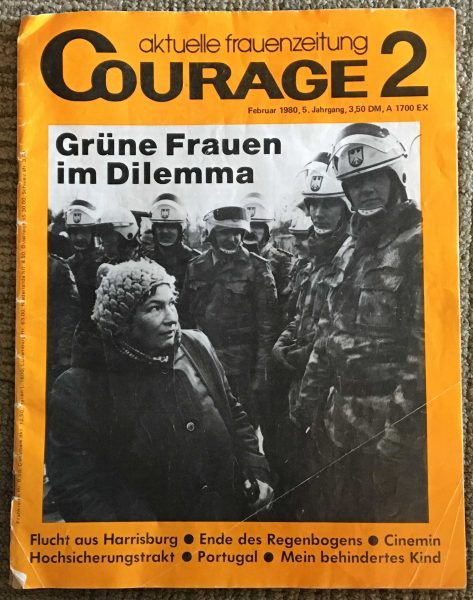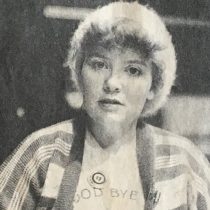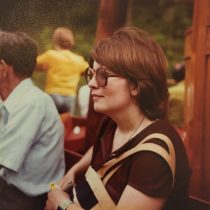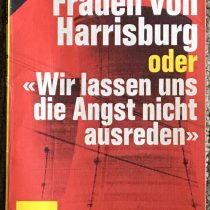 After the Three Mile Island accident, Pennsylvania resident Carol Shapiro Beck was interviewed by a German reporter about her experiences and TMI. Two articles were written from that interview. One appeared in the German women’s magazine Courage 2. The magazine article began (loose English translation):
After the Three Mile Island accident, Pennsylvania resident Carol Shapiro Beck was interviewed by a German reporter about her experiences and TMI. Two articles were written from that interview. One appeared in the German women’s magazine Courage 2. The magazine article began (loose English translation):
Escape from Harrisburg
What we could learn here about the accident in the nuclear reactor in Harrisburg always concerned only the technical side. I wanted to know more and drove it myself. Carol Shapiro is one of many women I spoke to in Harrisburg. She tells the story of her evacuation. As they did, 114,000 people from the area were then aligned.
Carol’ story was also referenced in a book of interviews titled:
Die Frauen von Harrisburg oder <<Wir lassen uns die Angst nicht ausreden>>
(loose English translation)
The women of Harrisburg, or (We do not let fear freak us out)
Here are excerpts from Carol’s story, as translated from German by the Cedar Cliff German Club, around 1980:
Please tell them you’re my mother and want to pick me up. I want to go home.
 “My husband and I left our work. However, we were ordered to leave quietly. I was to leave my work on the desk and get up and leave. We met the other managers in the elevator. They seemed to be more worried about their life than their work, however the other employees didn’t have enough guts to leave. The next thing we did was pick up out children from school. They had been forbidden to go outside, because of the radioactive fall-out. They locked all of the doors and windows. Inside, the kids were running around crying and screaming through the building, getting drink, smoking pot, and taking any drug they could get. They were totally hysterical. There were already ten parents down there when I arrived; Their children were called over the loudspeakers. Others tried to call their parents at home or work, so that they would pick them up from school. They tried to buy themselves a better place in the line. A girl offered ten dollars to get from the thirteenth to the second place in the line. Some kids begged me: “Please tell them you’re my mother and want to pick me up. I want to go home.” On the radio, they announced that everyone had to stay in their houses, but why? When radioactivity can get through meter-thick walls, then it will also go through my glass door or my aluminum siding. I think they only wanted us in our houses, so that they knew which body goes to which house, so they wouldn’t lose control over it.”
“My husband and I left our work. However, we were ordered to leave quietly. I was to leave my work on the desk and get up and leave. We met the other managers in the elevator. They seemed to be more worried about their life than their work, however the other employees didn’t have enough guts to leave. The next thing we did was pick up out children from school. They had been forbidden to go outside, because of the radioactive fall-out. They locked all of the doors and windows. Inside, the kids were running around crying and screaming through the building, getting drink, smoking pot, and taking any drug they could get. They were totally hysterical. There were already ten parents down there when I arrived; Their children were called over the loudspeakers. Others tried to call their parents at home or work, so that they would pick them up from school. They tried to buy themselves a better place in the line. A girl offered ten dollars to get from the thirteenth to the second place in the line. Some kids begged me: “Please tell them you’re my mother and want to pick me up. I want to go home.” On the radio, they announced that everyone had to stay in their houses, but why? When radioactivity can get through meter-thick walls, then it will also go through my glass door or my aluminum siding. I think they only wanted us in our houses, so that they knew which body goes to which house, so they wouldn’t lose control over it.”
He thought we owed it to the children to drive straight north.
“We wanted to go north to Reading, seventy miles away to my husband’s relatives, so that we could escape with them to Canada. My parents lived only ten miles away from Reading, and I wanted to get them, since we were so close, to escape together. My husband and I got into a horrible argument over it. He thought we owed it to the children to drive straight north. But then I got determined. My mother and I never understood each other, but I can’t stand the idea that I would let them be stranded. My husband said: “It will be too late, by the time you could get them.” And I said, “I’ll do what I have to do. It’s better than sitting somewhere in Canada and saying, ‘we are safe, but my parents are getting roasted down there.’” “There will be too many people leaving,” he said. We didn’t know of a hotel in Canada, where we could meet—he with his family and I with my family.”
he still has nightmares

Carol Shapiro
“After two days, we couldn’t find a way to get our families together. We were so upset that we didn’t know what we should pack. But my ten-year-old son sat down and made a list; a flashlight—in case of a blackout, drinking water, and a gas can. Then he helped my husband load the car. He showed him how to get more suitcases into the car, and thought about taking pillows along, etc. I never saw him like that. He was working better than the emergency-group of the nuclear power plant. He didn’t have any fear. A few times he started to shake and cry a little bit, but then he shrugged his shoulders: “That doesn’t help me now,” and went on. I thought that it would be worse for the boy, but it seemed like a good experience for him. It helped him. If a dangerous situation comes up, he can help anybody, anyhow at the drop of a hat. The psychological problems he had are getting better now. Also he still has nightmares, but that’s another story.”
She said I should contact a group called “TMI Alert”

Carol
“After the accident, I tried to find a way to control my feelings, and understand what had happened. The first demonstration took place in front of the Capitol Building in Harrisburg. I thought, “It’s not the right thing for me. I am not a demonstrator.” I wrote to Jane Fonda. If she could offer me a group, which is not Communist, and doesn’t consist only of hippies, such an organization in which people who are worried about it and want to have some influence on lawmaking, could do so without being arrested for it. I received an answer right away. She said I should contact a group called “TMI Alert”. So, I looked into it. Their office was low on money. They never had more than $50 at once. They looked like a nice bunch of people with the same concerns as I had. So I went to work. My husband was upset with me when I wrote to Jane Fonda. “You act like a hippie,” he said. We argued a lot. What he meant was that it was only one power plant; the mechanics were not good enough. Someone left the pump open, that was the only mistake. But then they found out that they were working with defective parts and there were 42 mistakes in the reactor. Even though my husband was not involved with the “TMI Alert”, he wanted to go along to the women’s and children’s march to Reading. He just wanted to go to watch. Then he met with a person who was filling up balloons with air for the children. With a lot of talk we got him to help. Then he helped pass them around. The next thing knew he was wearing a women’s and children’s march T-shirt, and telling people what to do, as he would if he were the boss. “What’s the matter with you?” I asked him. “It’s a good organization, and they are nice people. They have a lot of things to say.” He started listening and read the information listed by “TMI Alert”, and he stood up for it at Blue Shield. He had to see that the group was O.K. It’s hard for the people to fight against something that the government says is good. They are afraid to be seen as protestors. Some people in the group ate totally against nuclear power. But some—like me, think that it is a good idea, only it is too soon to use it. We are not ready for it. When they find a way for 100% safety, then I will be all for nuclear power. But I think it will take us about thirty to fifty years until we are ready for it. We would have lost everything by a meltdown. The houses would stay in good shape, and the plants would be very green and beautiful for a short period of time, but then everything would have died. It would look like winter without snow. It would be a ghost town. The area could be used only after 200 years. In the past, when the President said nuclear power is good, I believed him. Now I am skeptical about it. When I had children before, I had no worries. I would never have any now. I don’t want children to live in a world that is trying to kill itself.”
 Read the full translation:
Read the full translation:
Carol
What shall you take along, in case you couldn’t return? A Conversation with Carol Shapiro
